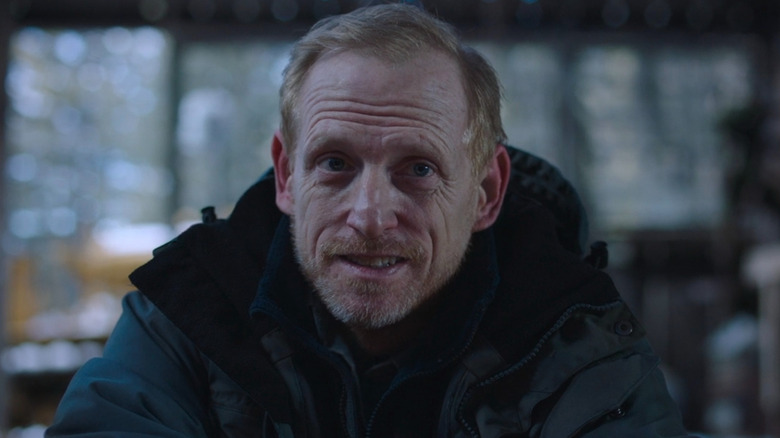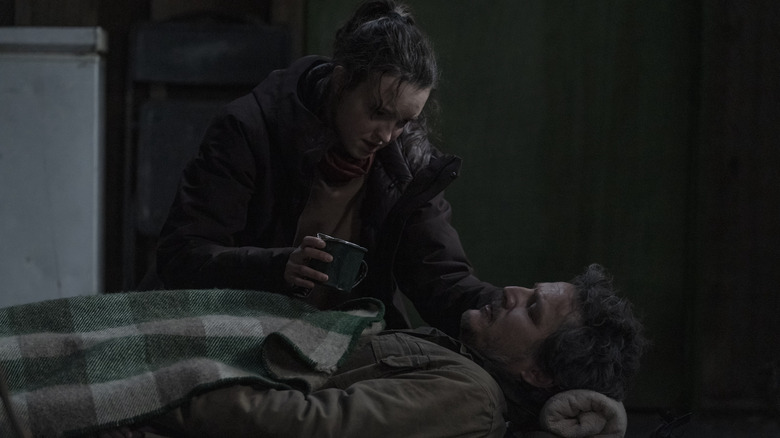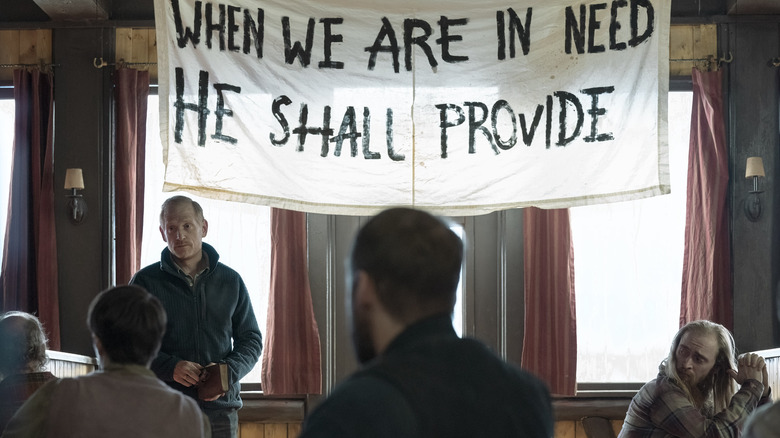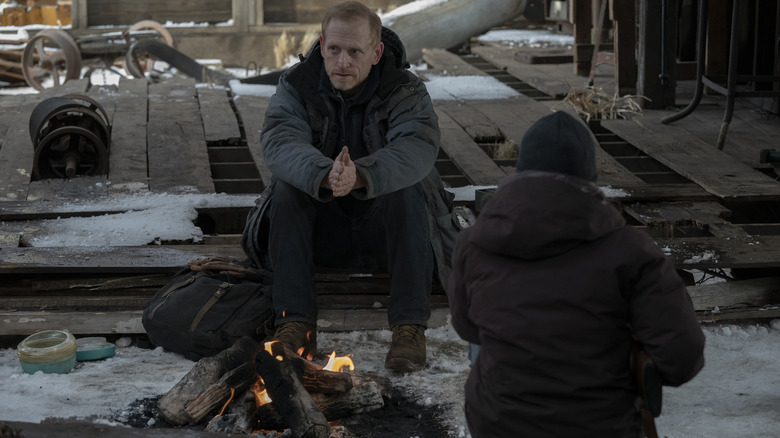How David From The Last Of Us Episode 8 Differs From His Video Game Counterpart
Contains spoilers for "The Last of Us" Season 1, Episode 8 — "When We Are In Need"
HBO's "The Last of Us" finally reached the game's darkest chapter, introducing their most repulsive antagonist yet in Scott Shepherd's David. After Joel (Pedro Pascal) was stabbed in the gut at the end of Episode 6, Ellie (Bella Ramsey) has been fighting tooth and nail to make sure they both survive the winter.
Originally voiced by prolific voice actor Nolan North, David has been embellished significantly in the HBO adaptation. Where the game would only reveal certain aspects of his character through vague one-liners, subtle actions, or missable in-game hints, the show takes its time exploring every facet of Joel and Ellie's latest foe. Whether or not this iteration of David is as effective as the original will be up to the viewers to decide, though it's hard to deny that creators Craig Mazin and Neil Druckmann have made him more disgusting and terrifying than he's ever been.
David has different introduction in the game
Arguably one of the biggest differences between David in the video game and David in the series is the context in which he's introduced. In the video game, the story cuts directly from Joel's seemingly fatal collapse to Ellie hunting on her own in the woods. It isn't until Ellie asks David, who she runs into while tracking a deer, about antibiotics that the player gets any sort of hint that Joel might still be alive.
For the series, HBO decided to break up the story by inserting an episode between Joel and Ellie's scrape at East Colorado University and her encounter with David and his men. Though much of Episode 7 is dedicated to the DLC flashback storyline "Left Behind," it is bookended by sequences of Ellie trying to save Joel's life in the present.
Because of this, David's camp isn't presented to the audience in the same way. Especially with the added scenes of David ominously presiding over his congregation, it's immediately clear that this is the episode's antagonist (Craig Mazin and co. seem less interested in the game's original twist than they are in exploring the tense dynamic at David's camp). In the game, however, for at least a brief moment it seems as though David could be Ellie's savior — a new friend to take care of her once Joel dies.
The game doesn't explore his religious beliefs
Speaking of the additional scenes of David's flock, Episode 8 leans hard into David's previously hinted-at religious ideology. As they have done for most characters and storylines in the series, HBO generally eschews the Easter egg-based world-building of the game, instead opting for more explicit storytelling.
In the game, the player (Ellie) fights David in Todd's Steakhouse, where they have the opportunity to spot a banner that reads "WHEN WE ARE IN NEED HE SHALL PROVIDE." Though we're never told who "he" is, it can be assumed this is in reference to a god or deity of some sort. It's also worth mentioning that original David voice actor Nolan North described the character as a shepherd watching his flock during a panel at Tampa Bay Comic-Con, which implies that David was always intended to be a religious leader of sorts.
Whatever the intent of these undertones, the HBO series depicts David as an out-and-out preacher, reading Bible verses in the steakhouse to a frightened but rapt congregation. Where the game leaves hints that David may be nefariously misinterpreting and wielding Christian scripture as propaganda, the series makes it seem as though he doesn't really believe any specific religion at all. Rather, he believes in the cordyceps' will to live and seeks to marry their methodology with the familiar and comforting language of Western religion in order to guide his people.
David's predatory undertones are more overt on HBO
The following slide discusses sexual assault and child abuse
In the video game, David's intentions for Ellie are simultaneously clear and subtle. The character verbally reveals very little, yet when he touches Ellie's hand it's obvious he has a warped, disgusting view of what their relationship could be. The HBO series complicates things slightly by adding dialogue to rationalize (from David's point-of-view) why he's drawn to Ellie specifically. After an extended discussion of David's violent history, the beauty of the cordyceps, and Ellie's leadership potential, the narrative road has taken far more turns than it originally had. Whether this helps or hinders the scene will likely depend on the audience.
The show also makes a bold choice during Ellie's final showdown with David. While it isn't explicitly spelled out for viewers, David stating that there's "no fear in love" as his hand moves toward his belt is more overt than anything that happens in the game in regards to this storyline. Setting aside the bizarre nature of David doing anything close to what was implied in the middle of a burning building, it's a large departure from David's death in the game.
When David tackles Ellie in the original story, he seems more angry than anything else. His last words are "You have no idea what I'm capable of," alluding to something darker but not implying anything imminent. It's possible the writers of the series felt Ellie's kill would have a greater impact if the audience had more clarity on David's intentions and/or if he was moments away from doing something unspeakably horrible. Again, whether or not this risky change pays off will be up to the viewers.
If you or anyone you know has been a victim of sexual assault, help is available. Visit the Rape, Abuse & Incest National Network website or contact RAINN's National Helpline at 1-800-656-HOPE (4673).



